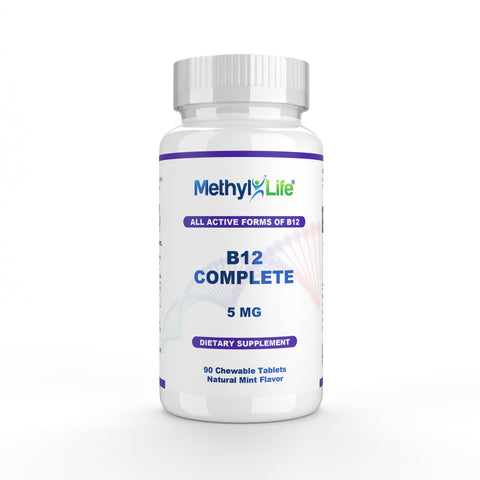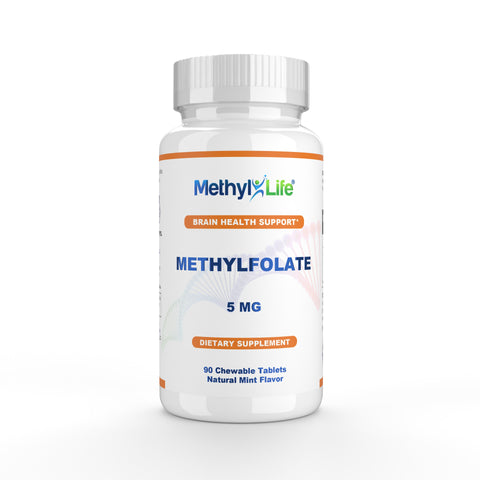
Is Anesthesia Risky for People with MTHFR?
Product Recommendations
B12 Complete 5 mg
$32.00
- All 3 Bioactive Forms of B12 for Full-Spectrum Absorption
- Methylcobalamin B12, Hydroxy B12 & Adenosylcobalamin
- 3rd-Party Tested for Purity, Potency & Safety
- 90 Vegan, Non-GMO, Chewable Mint Tablets
Product Recommendations
Methylfolate 5 mg
$44.00
- Bioactive 5 Methylfolate That Crosses Blood-Brain Barrier 3
- Supports Cardiovascular Function 5 & Brain Health 4
- 3rd-Party Tested for Purity, Potency & Safety
- 90 Vegan, Non-GMO, Chewable Mint Tablets
Product Recommendations
Calming Mind & Body Balance
$49.00
- GABA Provides a Sense of Calm & Helps Manage Cortisol
- GABA Promotes Restful Sleep & Supports Cognitive Function
- 3rd-Party Tested For Purity, Potency & Safety
- 60 Vegan, Non-GMO, Gluten-Free Servings

Written By:
Katie Stone - Naturopath
Medical Reviewer:
Dr. Nare Simonyan - PhD Pharmaceutical Science
Edited By:
Kari Asadorian - BSN, RNUpdated On:
March 23, 2025MTHFR, Nitrous Oxide, and Homocysteine
Nitrous oxide (N2O) is a colorless gas that is a major component of anesthesia used on patients undergoing medical procedures, usually in dentistry. It acts quickly, provides pain relief, and is eliminated from the body within a short period. It is also relatively low cost.
However, N2O effectively destroys vitamin B12 in the body1, which means B12 is not available to be used by methionine synthase in the conversion of homocysteine to methionine. As a result, conversion does not occur, and homocysteine remains elevated. This is especially serious for those with MTHFR as these individuals are already at risk of higher homocysteine2 levels.
Nitrous oxide use also means B12 is not available to function as a cofactor in producing succinyl CoA(Succinyl-coenzyme A), a mitochondrial enzyme involved in ATP (Adenosine Triphosphate) production, the citric acid cycle, ketone metabolism, and red blood cell formation.
Several studies have shown that short-term exposure to nitrous oxide increases plasma homocysteine3, which can last for several days.
One study involving 90 ASA (American Society of Anesthesiologists) Class I-III patients (patients with severe systemic disease) found that those with MTHFR mutations developed higher plasma homocysteine concentrations4 after treatment with nitrous oxide anesthesia than those without the mutation. This was associated with an increase in postoperative myocardial ischemia (a lack of blood flow and oxygen to the muscles of the heart).
MTHFR and General Anesthesia
General anesthesia is a risk to those with MTHFR if it contains nitrous oxide. Nitrous oxide cannot produce general anesthesia when used alone, which is why it is combined with other agents5 to induce a sedative/general anesthetic effect.
Acute increases in homocysteine caused by N2Ohave been linked to impaired endothelial function and procoagulant effects, suggesting an increased risk of postoperative myocardial ischemia6. The effects of N2O-induced homocysteine increases are responsible for myocardial infarctions occurring7 on the first postoperative night.
However, another study involving 500 patients found that acute homocysteine increases were not associated with perioperative cardiac troponin8 increase after N2O anesthesia. Troponin is a protein that appears in the blood only when the heart muscle is damaged, as in a heart attack.
Nitrous oxide is also linked to vitaminB12 deficiency9, which can cause spinal cord degeneration and various neurological symptoms such as ataxia, paresthesia, and loss of muscle function.
General anesthesia that does not contain N2Ois safe for those with MTHFR. A study involving patients treated with sevoflurane and propofol for anesthesia induction showed no harmful effects on homocysteine levels10 in those with MTHFR. Halogenated and intravenous anesthetics11 are also generally considered safe for patients with MTHFR.
Final Thoughts
Those with MTHFR deficiency face numerous health risks due to this enzyme's crucial role in the body. Although symptoms vary between individuals and variants, MTHFR gene mutations cause low or deficient levels of folate and B12, which has a range of downstream effects.
The increase in homocysteine levels means that those with MTHFR are at higher risk of cardiovascular and thromboembolic diseases12. Hyperhomocysteinemia predisposes patients to venous and arterial thrombosis with a three to six-fold increased risk13 compared to the normal population.
In addition, MTHFR increases the risk of mental health disorders14, chronic pain and fatigue15, miscarriages16, and neural tube defects17.
MTHFR patients must be aware of how to support their health. This includes supplementing with methylfolate and methylated vitamin B12, active forms which do not require the MTHFR enzyme to be used in the body.
Supplements containing these activated vitamins are available in the Methyl-Life® product range, designed specifically for those with MTHFR. Recommended supplements include L-Methylfolate, which can bypass the MTHFR mutation18 and is immediately available for use in the body.
Active vitamin B12 is vital if an MTHFR patient is exposed to N2O. Supplementation with B vitamins before anesthesia was shown to blunt the increases in homocysteine19 caused by nitrous oxide.
In addition, B12 functions alongside folate as a crucial component of the methylation cycle and homocysteine conversion. Methyl-Life® offers Active B12 as a powerful independent formula or in combination with Methylfolate for maximum convenience and bioavailability.
Learn more about MTHFR’s impact on the body and how taking vitamin B12 and methylfolate can help to manage symptoms.

Product Recommendations
Vitamin B12 5000 mcg (Methylcobalamin B12 Complete) – 3 Bioactive Forms
$32.00
- All 3 Bioactive Forms of B12 for Full-Spectrum Absorption
- Methylcobalamin B12, Hydroxy B12 & Adenosylcobalamin
- 3rd-Party Tested for Purity, Potency & Safety
- 90 Vegan, Non-GMO, Chewable Mint Tablets
Product Recommendations
5 Methylfolate: 5-mthf L-Methylfolate 5 mg
$44.00
- Bioactive 5 Methylfolate That Crosses Blood-Brain Barrier 3
- Supports Cardiovascular Function 5 & Brain Health 4
- 3rd-Party Tested for Purity, Potency & Safety
- 90 Vegan, Non-GMO, Chewable Mint Tablets
Product Recommendations
CALMING Your Stress Naturally with the Best GABA Supplement
$49.00
- GABA Provides a Sense of Calm & Helps Manage Cortisol
- GABA Promotes Restful Sleep & Supports Cognitive Function
- 3rd-Party Tested For Purity, Potency & Safety
- 60 Vegan, Non-GMO, Gluten-Free Servings
References
-
Ehizogie Edigin, Oyintayo Ajiboye, Avantika Nathani; "Nitrous Oxide-induced B12 Deficiency Presenting With Myeloneuropathy"; Cureus; 2019 Aug
https://www.ncbi.nlm.nih.gov/pmc/articles/PMC6777927/
-
Elizabeth A. Varga, Amy C. Sturm, Caron P. Misita, Stephan Moll; "Homocysteine and MTHFR Mutations: Relation to Thrombosis and Coronary Artery Disease"; Circulation; 2005 May
https://www.ahajournals.org/doi/10.1161/01.CIR.0000165142.37711.E7
-
Peter Nagele, Frank Brown, Amber Francis, Mitchell G Scott, Brian F Gage, J Philip Miller, for the VINO study team; "Influence of Nitrous Oxide Anesthesia, B-Vitamins, and MTHFR gene polymorphisms on Perioperative Cardiac Events: The Vitamins in Nitrous Oxide (VINO) Randomized Trial"; Anesthesiology; 2014 Ju;
https://www.ncbi.nlm.nih.gov/pmc/articles/PMC3919550/
-
N H Badner, W S Beattie, D Freeman, J D Spence; "Nitrous oxide-induced increased homocysteine concentrations are associated with increased postoperative myocardial ischemia in patients undergoing carotid endarterectomy"; Anesthesia and analgesia; 2000 Nov
https://pubmed.ncbi.nlm.nih.gov/11049886/
-
Daniel E Becker, Morton Rosenberg; "Nitrous Oxide and the Inhalation Anesthetics"; Anesthesia progress; 2008
https://www.ncbi.nlm.nih.gov/pmc/articles/PMC2614651/
-
N H Badner, W S Beattie, D Freeman, J D Spence; "Nitrous oxide-induced increased homocysteine concentrations are associated with increased postoperative myocardial ischemia in patients undergoing carotid endarterectomy"; Anesthesia and analgesia; 2000 Nov
https://pubmed.ncbi.nlm.nih.gov/11049886/
-
George, Rubin; Menon, Vidya P., Edathadathil, Fabia, Balachandran, Sabarish, Moni, Merlin, Sathyapalan, Dipu, Prasanna, Preetha, S, Gokuldas, Paul, Jerry, K.K., Chandrababu D Ortho, MS Orthog, Kumar, Lakshmi, Pillai, Ashok; "Myocardial injury after noncardiac surgery—incidence and predictors from a prospective observational cohort study at an Indian tertiary care centre"; Medicine; 2018 May
https://journals.lww.com/md-journal/Fulltext/2018/05110/Myocardial_injury_after_noncardiac.3.aspx
-
James P. Rathmell; Anesthesiology; ASA Publications
https://pubs.asahq.org/anesthesiology/article/119/1/19/11489/Influence-of-Nitrous-Oxide-Anesthesia-B-Vitamins
-
Ralph Green, Laurence J. Kinsella; "Current concepts in the diagnosis of cobalamin deficiency"; Neurology; 1995 Aug
https://n.neurology.org/content/45/8/1435
-
Zeynep Nur Orhon, Emine Nursen Koltka, Sevil Tüfekçi, Çiğdem Buldağ, Alperen Kısa, Çiğdem Ulukaya Durakbaşa, Melek Çelik; "Methylene Tetrahydrofolate Reductase Deficiency: the Hidden Risk in Paediatric Anaesthesia"; Turkishh Journal of Anaesthesiology & Reanimation; 2017 Apr
https://www.ncbi.nlm.nih.gov/pmc/articles/PMC5656162/
-
Nicole Hale, Debra Minzola; "Methylenetetrahydrofolate Reductase Deficiency: A Case Report"; AANA journal; 2020 Aug
https://pubmed.ncbi.nlm.nih.gov/32718428/
-
Ahmed Zaghloul, Corina Iorgoveanu, Aakash Desai, Kathir Balakumaran, Kai Chen; "Methylenetetrahydrofolate Reductase Polymorphism and Premature Coronary Artery Disease"; Cureus; 2019 Jun
https://www.ncbi.nlm.nih.gov/pmc/articles/PMC6716763/
-
Zeynep Nur Orhon, Emine Nursen Koltka, Sevil Tüfekçi, Çiğdem Buldağ, Alperen Kısa, Çiğdem Ulukaya Durakbaşa, Melek Çelik; "Methylene Tetrahydrofolate Reductase Deficiency: the Hidden Risk in Paediatric Anaesthesia"; Turkishh Journal of Anaesthesiology & Reanimation; 2017 Apr
https://www.ncbi.nlm.nih.gov/pmc/articles/PMC5656162/
-
Lin Wan, Yuhong Li, Zhengrong Zhang, Zuoli Sun, Yi He, Rena Li; "Methylenetetrahydrofolate reductase and psychiatric diseases"; Translational Psychiatry; 2018 Nov
https://www.ncbi.nlm.nih.gov/pmc/articles/PMC6218441/
-
Ying Liao, Jian-Guang Qi, Hui Yan, Qing-You Zhang, Tao-Yun Ji, Xing-Zhi Chang, Hai-Po Yang, Hong-Fang Jin, Jun-Bao Du; "Comorbidity of chronic fatigue syndrome, postural tachycardia syndrome, and narcolepsy with 5,10-methylenetetrahydrofolate reductase (MTHFR) mutation in an adolescent: a case report"; Chinese Medical Journal; 2021 Mar
https://www.ncbi.nlm.nih.gov/pmc/articles/PMC8213257/
-
Philippe Merviel, Rosalie Cabry, Emmanuelle Lourdel, Segolene Lanta, Carole Amant, Henri Copin, Moncef Benkhalifa; "Comparison of two preventive treatments for patients with recurrent miscarriages carrying a C677T methylenetetrahydrofolate reductase mutation: 5-year experience"; Journal of International Medical Research; 2017 Jan
https://www.ncbi.nlm.nih.gov/pmc/articles/PMC5805189/
-
Peadar N Kirke, James L Mills, Anne M Molloy, Lawrence C Brody, Valerie B O'Leary, Leslie Daly, Sharon Murray, Mary Conley, Philip D Mayne, Owen Smith, John M Scott; "Impact of the MTHFR C677T polymorphism on risk of neural tube defects: case-control study"; BMJ : British medical journal / British Medical Association.; 2004 Jun
https://www.ncbi.nlm.nih.gov/pmc/articles/PMC437144/
-
Maša Vidmar Golja, Alenka Šmid, Nataša Karas Kuželički, Jurij Trontelj, Ksenija Geršak, Irena Mlinarič-Raščan; "Folate Insufficiency Due to MTHFR Deficiency Is Bypassed by 5-Methyltetrahydrofolate"; Journal of Clinical Medicine; 2020 Sep
https://www.ncbi.nlm.nih.gov/pmc/articles/PMC7564482/
-
Peter Nagele, Frank Brown, Amber Francis, Mitchell G Scott, Brian F Gage, J Philip Miller, for the VINO study team; "Influence of Nitrous Oxide Anesthesia, B-Vitamins, and MTHFR gene polymorphisms on Perioperative Cardiac Events: The Vitamins in Nitrous Oxide (VINO) Randomized Trial"; Anesthesiology; 2014 Ju;
https://www.ncbi.nlm.nih.gov/pmc/articles/PMC3919550/
-
Banner Image Designed by Freepik
https://www.freepik.com/

About the Author
Katie is a qualified Naturopath (BNatMed) and freelance writer from New Zealand. She specializes in all things health and wellness, particularly dietary supplements and nutrition. Katie is also a dedicated runner and has completed more half-marathons than she can count!
Related Articles

What is the Best Form of B12 for You?
Written By: Jamie Hope - Methyl-Life® Founder

Like what you read?
Please subscribe to get more content like this sent to your inbox.
Share This Article
Trusted by Experts. Backed by Science.
Trusted professionals crafting original content backed by verified research. Since 2012, Methyl-Life® has been dedicated to providing evidence-based education to help individuals better understand methylation and nutritional wellness.
-

Expert-authored education
Every article and guide is written or reviewed by professionals specializing in methylation science and nutritional biochemistry.
-

Research-verified information
Our content references peer-reviewed studies and verified data, ensuring accuracy, integrity, and real-world relevance.
-

Educational leadership since 2012
A founder-led team collaborating with clinicians, researchers, and health writers to make complex science accessible and actionable.
-

Transparent and trustworthy
All educational materials undergo internal review for scientific accuracy, compliance, and clarity before publication.
Blog Categories
Table of Contents
Product Recommendations
Vitamin B12 5000 mcg (Methylcobalamin B12 Complete) – 3 Bioactive Forms
$32.00
5 Methylfolate: 5-mthf L-Methylfolate 5 mg
$44.00
CALMING Your Stress Naturally with the Best GABA Supplement
$49.00









